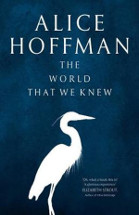The world that we knew by Alice Hoffman

Simon and Schuster, 2019. ISBN: 9781471185830.
(Age: Adolescent readers, with support) This beautifully written and
most unsettling narrative captures our imagination instantly,
plunging us into the terror of the German government's plan to
exterminate the Jewish people of Europe. From our 21st century point
of view this vile scheme was dire and inhumane. Yet it happened and
Alice Hoffman delves into the agony and terror faced by people who
were simply 'wrong' in one government's notion of what makes some
people simply unacceptable, thereby justifying getting rid of them.
While we know that horrendous crimes against people for no more than
their religious beliefs and lifestyle have taken place over the
years of human history, this story is one that speaks of brutality
at its worst and of dreadful injustice, of despicable treatment of
both children and adults, all apparently embedded in the notion that
those who are unwanted can simply be eradicated.
Helped by good people in France, who ask no questions but offer
shelter, and sometimes food, the fleeing girls go on their perilous
journey. They spend time in barns, on farms and in a school where
they are disguised as locals. Terrified for her children's lives,
one mother realises that she cannot flee with children as they will
almost certainly be apprehended if she accompanies them, so, in
desperation, she creates a golem, a Jewish mystical creature created
from the materials of the earth, to guard and guide her daughter.
This mystical element is deeply embedded in the narrative, and is
representative of the trust in the elements of our universe to be
good, kind and trusting, as we see in the decency of those who offer
sanctuary to the strangers. The golem leads them to safety, as they
travel away from all that they know and those whom they loved in
their own world, to a world that is unknown but offers them the
chance of a future. This decision is critical, agonising and
indicative of the enormous trust in God that this women's actions
suggest.
The book is suitable for adolescent readers, with guidance and
support, as it details how parents would know that the only chance
for their children to live is to flee without parents, as this would
imperil them, to be recognized as fleeing Jews.
Elizabeth Bondar